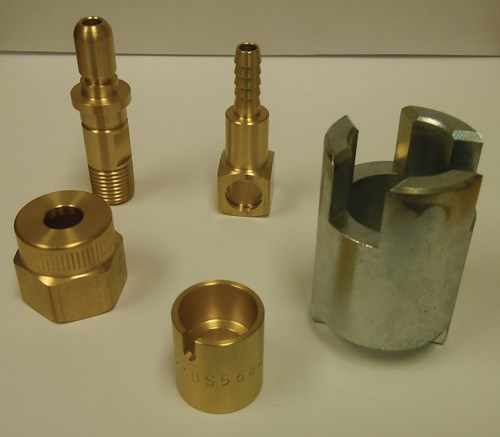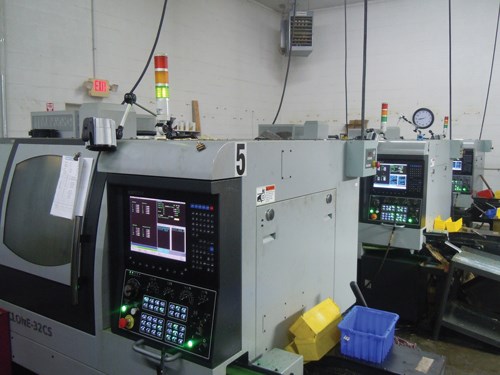A Shop's Trial by Fire
Willis CNC turned a potential disaster into a positive experience. By finding machines that suit the company’s jobs and its operators well, the staff worked through the fire’s ashes without losing any customers, and the experience strengthened the company.
Often in metalworking shops when machine tools cease proper operation, a shop swears off the brand that let it down. One shop in Columbia Station, Ohio, however, didn’t give up on one of its machine tools when it stopped working, primarily because it wasn’t the machine’s fault it had broken down. This past January 14, a fire started in the facility that Willis CNC LLC shared with a mechanic. The mechanic had used a torch while unaware of a leaking gas tank. This started a fire that burned the building to the ground, and with it, Willis CNC’s machine tools.
Willis CNC had every opportunity to switch brands and experiment with a different machine, but the company wasn’t interested. In fact, it ended up rebuilding two of the Ganesh Cyclone machines that were damaged in the fire and bought three more of the same brand.
Willis CNC turned a potential disaster into a positive experience. By finding machines that suit the company’s jobs and its operators well, the staff worked through the fire’s ashes without losing any customers, and the experience strengthened the company.
The company’s history begins in 2006 when Willis CNC’s Owner and President Jeremy Willis reached his goal of owning his own business. Mr. Willis began his career with CNC machining long before that. He started out working as a parts washer at a machine shop his dad worked for and eventually worked his way up to the CNC machining area of the shop. With that experience under his belt, he moved on to several other CNC machine shops through the years and later became a supervisor. He decided that the next logical step was to open his own shop. Now, his goals rest upon the success of his business.
With a staff of only six, Willis CNC machines parts for various industries such as automotive, construction and military, and also machines medical and dental fittings. Its customers include a medical and dental OEM, an instrumentation company and a tool and die machine shop. “Some of my customers, whenever they get a certain job, they give it to me because it is cheaper to pay me to do it than for them to do it themselves,” Mr. Willis explains. “I can do it in a single operation and they cannot.”
Parts for Willis CNC’s jobs normally range from 1/8 to 11/4 inch. Typical lot sizes are between 350 and 5,000 pieces, using mostly bar-fed materials including mild steels, mild stainless, brass and aluminum.
Like any busy machine shop, Willis CNC couldn’t afford to waste time after the fire. The company couldn’t let the incident become too detrimental to its customers’ orders, although naturally, orders fell slightly behind. In fact, at the time of the fire, customers had been increasing their orders, so the shop needed to purchase new machines quickly. “We were looking at maximum output with the least amount of labor to keep costs down,” Mr. Willis says.
“When I was looking for the replacement machines, I wanted a pickoff spindle machine and something for short parts with live tooling,” he says. “The Ganesh Cyclone seemed to have the best machine for the money.”
Currently, the company’s shop floor houses five Cyclone CSs, one Cyclone GT and one Hwacheon turning center. The CS has a 32-mm bar capacity; 27 tools, including 11 live tools; a full Y axis and high performance C axis; as well as a parts catcher with a conveyor and chip auger.
Water soluble coolant is used in all of Willis CNC’s machines because the shop does some lights-out work and management doesn’t want to worry about a fire starting during unattended machining, Mr. Willis says. “We average about 40 hours of lights-out machining per week on one machine,” he says. “We generally run a job for a couple hours that is 250-300 pieces.”
For safety reasons, the company doesn’t run lights-out entirely unattended. “The operators take turns coming through at about 9 or 10 p.m. to see if everything is running smoothly on the nights we are lights-out,” Mr. Willis says. “We restock, check coolants and make sure it’s OK to continue to run. We usually take a night between the five of us.”
Because Willis CNC doesn’t have highly complicated, delicate parts or rotational cutting, operators can get by with manual programming on their machines. Operators program the machines on and offline. “From what I’ve seen from demos, the average part programs in about 30 minutes, and we do most parts by hand in 20 to 25 minutes,” Mr. Willis says. “At this point, it wouldn’t be cost effective to use CAD/CAM.”
For now, Mr. Willis is satisfied with focusing on the company’s strength and niche—live tool turning—and not branching out into other areas of machining. “We do live tool turning well and at a good price,” he says. “Our customers at other machine shops don’t have the capability to do processes in a single operation like we do. We are still fairly small, and getting people trained to use the machines is important. I don’t want to branch out into other things that will slow down other processes and affect our customers.”
It would be different if Willis CNC had an abundance of skilled labor to do different kinds of jobs, but manufacturing shops today don’t have that luxury. “It is a matter of finding a quality individual who can learn,” Mr. Willis says. “It is more beneficial to find someone who has the drive and good work ethic, than it is to get someone with a lot of machining experience.”
A strong company like Willis CNC can not only bounce back from a fire quickly, but turn an almost-tragic event into a positive one. The fire has made the company more cautious about how safely its machines run and has made it not take anything for granted. It also has made the employees realize the value of the company’s turning machines, so much that they purchased more of these machines after the fire, making their processes more efficient for customers.
— Expand Machinery
Related Content
Swiss Rejuvenation Doubles Shop Productivity
As he progressed to CNC Swiss lead and later to his current position as CNC Swiss production supervisor, Darrin Baker helped the Swiss department at Liberty Precision double its productivity, according to his nominator.
Read MoreMoldmaker Finds Value in Swiss-Type Machining
This multifaceted manufacturer has added CNC sliding-headstock turning technology to complement its established mold tooling production and new injection molding capabilities as it continues to pursue complex medical work along a vertically integrated path.
Read MorePMTS 2023 Product Preview: Swiss-Types
Learn about some of the latest Swiss-type solutions that will be on display at PMTS 2023.
Read MoreGetting More Production From Swiss Turning Centers
Buying a new CNC Swiss turning center is a substantial investment. For the best return, look closely for capabilities that enable the best utilization of the machine.
Read MoreRead Next
Emerging Leaders Nominations Now Open
Here’s your chance to highlight a young person in your manufacturing business who is on the path to be a future leader moving your company forward.
Read MoreDo You Have Single Points of Failure?
Plans need to be in place before a catastrophic event occurs.
Read MoreA Tooling Workshop Worth a Visit
Marubeni Citizen-Cincom’s tooling and accessory workshop offers a chance to learn more about ancillary devices that can boost machining efficiency and capability.
Read More











.jpg;maxWidth=300;quality=90)













